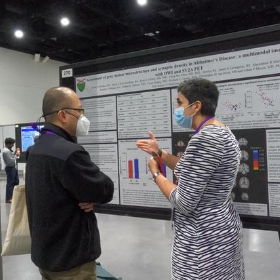It’s with a critical eye that I write my blog this month, as I am planning to attend an early career (ECR) event in person early next month. Even as a postdoc with quite a few years of experience under her belt, I still have that niggling feeling of guilt when I take time away from the lab and the foreboding anxious wait to see if it was actually worth it. In this blog I want to share my thoughts on attending these types of events, what can be gained from them, why some of us might feel guilty attending and some tips to help you decide if that ECR event really is worth your time.
Most, if not all conferences now days have a dedicated ECR day. Giving ECRs like myself, the chance to network, share ideas, present and discuss science or any ECR hot-topic, without the looming shadows of their principal investigators (PIs). On the rise, lately, have also been ECR only events, i.e a mini conference over one or two days that is exclusively attended – and most often organised – by ECRs. This last one, is exactly what I will be attending in a couple of weeks’ time. Exited? Tick. Nervous? Tick. Feeling guilty? Double tick.
And why would I be feeling doubly guilty for attending? For me at least, it’s always been about the pressure – that most often I put on myself – of making sure that this event is worth it. That the one or two days that I am away from the bench and my experiments are well spent. In other words, not coming back to work and admitting that I should have stayed put and planed another experiment. Because let’s face it, there are always more experiments to be planned and done. But it’s with this in mind, that I also recognise the benefit of these events. They give me space, to take time away from the lab and to chat to other people – that are not in my lab – about my science. Maybe too often we are stuck and comfortable in our science bubble when we just need to pop it.
There might also be other pressures that go hand-in-hand with being able to attend these ECRs events. One of these pressures, for me, was my PI at the time. My attendance of these events if I was to trace it back from my PhD to now, really does yo-yo. Ranging from three to four a year to none. My top tip here is to talk to your PI and really do make a case for attending, if you think it will be beneficial for you, your career and your science. And if the decision is not the outcome you were hoping for, contact the event organiser to ask if they could share any materials or meeting notes following the event. On a related note – and perhaps the one silver lining of COVID – ask if the meeting is going to be recorded. More often than not, at least the talks will be.

Many events are returning to being in-person only, or only having online elements for part of the day
Another pressure, which rears its head more often than not, is funding – can the lab afford to pay for me to attend? In my experience, registration for these events is almost always free, some even offer free accommodation and cover food costs, but travel is always an expense, and depending on location, this can very quickly rack up. There are bursary type awards that can be used to cover travel and accommodation costs, I myself have applied to Guarantors of Brain in the past to help subsidise these costs. Do your research, and find out if you would be eligible to apply for any of these bursaries, before booking onto the event. If you aren’t eligible, is the expense something your grant could comfortably cover? And most importantly, would this cost mean you might not be able to attend another conference or event in the near future?
And this last question prompts me to tackle the why of why are you wanting to attend this ECR event. Clearly you are drawn in by the meeting programme – or you would have deleted the email already – but which aspect in particular? Is it the scientific talks? In which case, would attending online, if available, be a worthwhile option? Or is it for the discussion sessions? Or the workshops within it? Or perhaps there is someone in particular, a keynote speaker or PhD student/postdoc in another lab, that you really want to talk to? In which case, attending in person would really be the only option. And as a side note – do really make sure you go and speak to them!
And lastly, ask yourself these two questions:
Is the timing of the event, right?
Could you get a similar outcome from attending another ECR event or conference later on in the year?
For me, these are the two hardest questions to answer, as they potentially involve giving up a short-term gain for a longer-term reward. I found that the best way for me to answer these two questions – objectively – is to plan ahead. Both in terms of experimental plans and conference/event attendance. Looking at the year ahead, what are the conference/events that I absolutely can’t or do not want to miss? Which months are going to be my busiest? Consider experimental work and any other commitments, such as teaching or supervision. And then assess if attending this ECR event fits in with your schedule or if it’s going to significantly disrupt any of the above. Taking the time to map all of this out is a worthwhile exercise and will hopefully help you manage your time, and help identify priorities to avoid stretching yourself too thin.
When I reflect back on all of the ECR events I have attended in my career, one word immediately jumps out – breadth. And they quite clearly reflect my career stage at the time. During my first years as a PhD student, I attended ECR events on careers in and outside of academia, on writing, publishing and reviewing papers. In these events I felt quite passive, I was listening, taking notes and trying to extract any useful information I could apply to my every day or in my career moving forward. Journeying from final year PhD student to postdoc I started attending more science focused ECR events, primarily those linked to bigger conferences, where I was given an additional opportunity to present my work. Here I wanted to expand my research network – what lab would I want to join next and why? And in the last year or so – as a more senior postdoc – I am focusing on attending ECR events that are 1) really relevant to my current field of work – as I have shifted focus somewhat – and 2) that provide a mixture of talks and discussions. I am finding these type of events particularly useful to cultivate my immediate research network, gauge where the field might be heading, and learn about new and exciting techniques to help shape ideas I might want to explore in a not too far fellowship application.
By now, you might be asking yourself if I am ever going to answer the question – are these ECRs events worthwhile attending? Hopefully, if I have done one thing right, is to highlight that the answer is not black and white – it really depends. It depends on timing, on funding, on your PI, on your career stage but ultimately, it’s dictated by you and what you want to gain out of each one.
And finally – good luck! It’s not easy to find lab work and career development nirvana – I, for one, am still searching for the balance.

Dr Gaia Brezzo
Author
Dr Gaia Brezzo [1]is a Research Fellow based within the UK Dementia Research Institute at The University of Edinburgh. Gaia’s research focuses on understanding how immune alterations triggered by stroke shape chronic maladaptive neuroimmune responses that lead to post-stroke cognitive decline and vascular dementia. Raised in Italy, Gaia came to the UK to complete her undergraduate degree, and thankfully, stuck around. Gaia writes about her work and career challenges, when not biking her way up and down hills in Edinburgh.